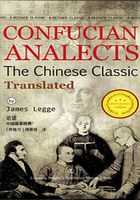
CHAPTER 8
1. Tsze-hea asked, saying, "What is the meaning of the passage—'The pretty dimples of her artful smile! The well defined black and white of her eye! The plain ground for the colours?'"
2. The Master said, "The business of laying on the colors follows the preparation of the plain ground."
3. "Ceremonies then are a subsequent thing." The Master said, "It is Shang who can bring out my meaning. Now I can begin to talk about the odes with him."
7. THE SUPERIOR MAN AVOIDS ALL CONTENTIOUS STRIVING. Here 君子=尚德之人, 'the man who prefers virtue'. 必也射乎lit., 'if he must, shall it be archery?' 揖让, according to Choo He, extend over all the verbs, 升, 下, 饮, 下 is marked in the 3d tone, anciently appropriate to it as a verb. 饮, up.3d tone, 'to give to drink', here=to exact from the vanquished the forfeit cup. In Conf. time there were three principal exercises of archery:—the great archery, under the eye of the Emperor, the guests' archery, which might be at the imperial court or at the visits of the princes among themselves, and the festive archery, for amusement. The regulations for the archers were substantially the same in them all, and served to prove their virtue, instead of giving occasion to quarreling. There is no end to the controversies among comm. on minor points.
8. CEREMONIES ARE SECONDARY AND ORNAMENTAL. 1. The sentences quoted by Tszehea are from a 逸诗, one of the poems which Conf. did not admit into the She-king. The two first lines, however, are found in it, I.v.3. The disciple's inquiry turns on the meaning of 以为 in the last line, which he took to mean—'The plain ground is to be regarded as the colouring'. 2. Conf., in his reply, makes 后 a verb, governing 素,= 'comes after the plain ground'. 3. 礼后乎, Tsze-hea's remark is an exclamation rather than a question. 起予者, 'He who stirs me up'= 'He who brings out my meaning'. On the last sentence, see I.15—The above interpretation, especially as to the meaning of 绘事后素, after Choo He, is quite the opposite of that of the old interpreters. Their view is of course strongly supported by the author of 四书改错, VIII.3.
